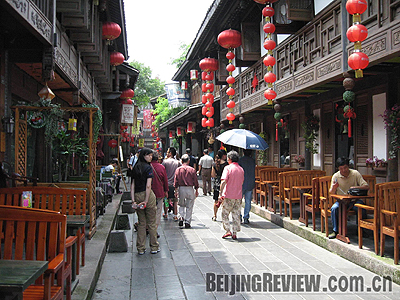|
 |
|
OPENING HOURS: Business as usual in the lanes of Chengdu City (JIANG WANDI) |
Upon visiting Chengdu, capital city of Sichuan Province, it is hard to imagine that just 73 km from the city so much destruction and suffering exist. This is not a city that seems at the edge of one of the world's worst natural disasters of recent times. Over two months have passed since the earthquake caused so much devastation to Sichuan, and on the surface life appears to continue as if nothing happened for the people of Chengdu City. The cicadas in the trees above the thriving tourist lanes hum as vibrantly as the energy of the city. The people here wish to move on. Of course there is much work to be done, but in their resilience to the challenges and tasks ahead, residents are adamant that the destroyed areas will be built better than before.
The earthquake has had an impact in many ways—fiscally, the tourism industry of Chengdu has been hit hard. The Tourism Bureau of the city believes this is partly due to peoples' fears of aftershocks, but also due to misunderstandings. The earthquake mainly affected the village areas to the west of the city. However, various international media sources misreported that Chengdu had experienced a catastrophic earthquake, when the actual truth was that very little structural damage affected the city itself, owing to the tectonic substructure under the plains around it.
 |
|
BEAR NECESSITIES: A bear eats out at the Research Base of Panda Breeding. Visitor numbers have dropped, but Chengdu survives (Yuan Yuan) |
Consequently, visitor figures have dropped. Hotel occupancy is reported to be 30 percent currently, compared to an average in the low season of between 50-60 percent and 80 percent in the high season. According to Guan Heyu, General Manager of the Chengdu Overseas Tourism Corp. Ltd., while his company made an estimated 6 million yuan ($857,000) in May compared to 30 million yuan ($4 million) in the same period last year, just 3 million yuan ($428,000) was procured in June.
|
